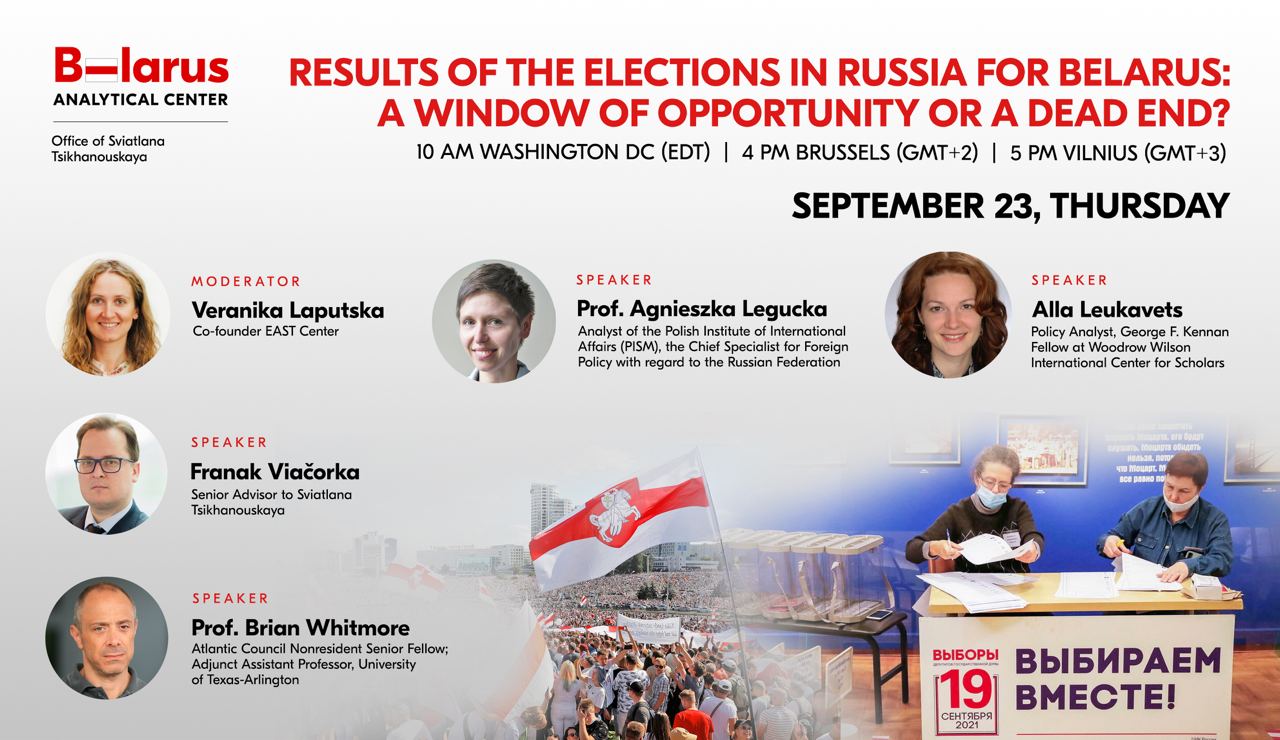The Research Center of Sviatlana Tsikhanouskaya's Office holds weekly expert discussions online with international experts on Belarus’ pressing matters. On September 23, 2021, we discussed the topic “Results of the Elections in Russia for Belarus: a Window of Opportunity or a Dead End?”.
Senior advisor to Sviatlana Tsikhanouskaya, Head of the Foreign Policy Department Franak Viacorka, policy analyst, George F. Kennan Fellow at Woodrow Wilson International Center for Scholars Alla Leukavets, Atlantic Council Nonresident Senior Fellow, adjunct assistant Professor of the University of Texas-Arlington Brian Whitmore, and analyst of the Polish Institute of International Affairs (PISM), Chief Specialist for Foreign Policy with regard to the Russian Federation Agnieszka Legucka presented their visions and ideas about the outcomes of the Russian elections and their influence on the situation in Belarus. Co-founder EAST Center Veranika Laputska moderated the discussion.
Despite the non-democratic tendencies in contemporary Russia, elections there still play an important role while they are seen as a tool of legitimacy provision for the country’s political elite and Vladimir Putin himself. In addition, they also produce a Parliament (State Duma) that designs and passes laws, controls key public appointments, and performs other essential political functions in a manner suitable for the country’s political leadership. Russia’s ruling United Russia party retained its majority in parliament after a three-day election and a sweeping crackdown on its critics, despite losing around one-fifth of its support. A tactical voting campaign (Smart Voting) as a strategy of the opposition appears to have inflicted further damages. Being aware of these risks, the Russian authorities put a lot of effort into mitigating them. In what way the 2021 Parliamentary elections in Russia might influence the situation in Belarus? Will it open any window of opportunities for the Belarusian democratic forces? What will be the position of the newly elected Duma and deputies towards the Belarusian political crisis?
The experts came to the following conclusions:
- Russian elections to the State Duma from the analytical perspectives probably should not be called ‘elections’ while de facto they are rather a legitimization ritual which they go through to legitimize its continued rule.
- The 2021 State Duma elections in Russia did not become a big event for Belarus. It was not broadly covered in Belarusian media, and the Belarusian public didn’t have much interest in it.
- These elections most probably won’t change anything in Russia's position towards Belarus. However, being non-democratic itself, the Russian government might feel threatened and do everything in its power to prevent the existence of transparent democracies on its borders. It's clear that in the long-term perspective, Russia's playbook vis-à-vis Belarus will continue to focus on gradually and slowly pressuring its neighbor into developing deeper and closer military, economic and political ties.
- Military exercises Zapad 2021 ended without any unexpected consequences, however, the military rotation and drills take place regularly in different forms, and there is an extensive Russian military presence in Belarus all the time. The constant rotation of troops means a de-facto permanent Russian military presence on the Belarusian territory creating a security threat for Poland, Latvia, and Lithuania.
- Some newly elected (or rather appointed) to the State Duma MPs are more radical, and some of them were quite aggressive towards Belarus in their rhetoric before. There will be more MPs who are not treating Belarus as a separate country that deserves to be independent and sovereign which is a worrying trend. Although opinion polls in Russia show that people are not much supportive of Belarus’ incorporation into Russia.
- There is a rise of post-Soviet generations in both (Belarus and Russia) societies, and there is a common cause among the civil societies. If we have an axis of autocrats between Lukashenka and Putin, we need to have an alliance of democratic institutions between the Belarusian and the Russian civil societies.
- Over the last 26 years, thanks to Russia's generous support in the form of cheap energy resources and financial aid, Belarus has been turned into a sponsored authoritarian regime. Lukashenka's power in Belarus is to a great extent based on Russia's support. If Russia is taken out of this equation, democratization in Belarus can happen much easier and much faster.
- We can expect that the relationship between Lukashenka and Putin will be developing on the same trajectory they were developing last months. It means there will be public, visible media support: regular meetings in Moscow or Minsk and other demonstrations of unity which are tremendously important for Lukashenka to prove that Russia supports him. However, these relations most probably won’t bring substantial financial benefits to Lukashenka.
- Recently announced integrational road maps (or programs) are of very general character but they are not much different from what was discussed in the previous years.
- Lukashenka himself is afraid that Belarus might lose its sovereignty while then he loses his position. However, Belarusian people should be concerned and do not stop emphasizing the importance of protecting the country’s sovereignty. Today, we see that there is quite a consensus in Belarusian society that Belarus should be independent and sovereign.
- In the beginning, there were attempts of the democratic forces to build some contacts with the Kremlin by the democratic forces, the Coordination Council. But they failed, and all the contacts are remaining on the expert level mostly.
- In the future, the democratic forces, when they come to power, are not going to cut or destroy relationships with Russia, but they will change its content and character. The democratically updated relations with Russia will be transparent and based on the rule of law.
For questions about the discussion, contact [email protected].
For the OST position on Russia contact Senior Advisor to Sviatlana Tsikhanouskaya, Head of the Foreign Policy Department Franak Viacorka: [email protected].








